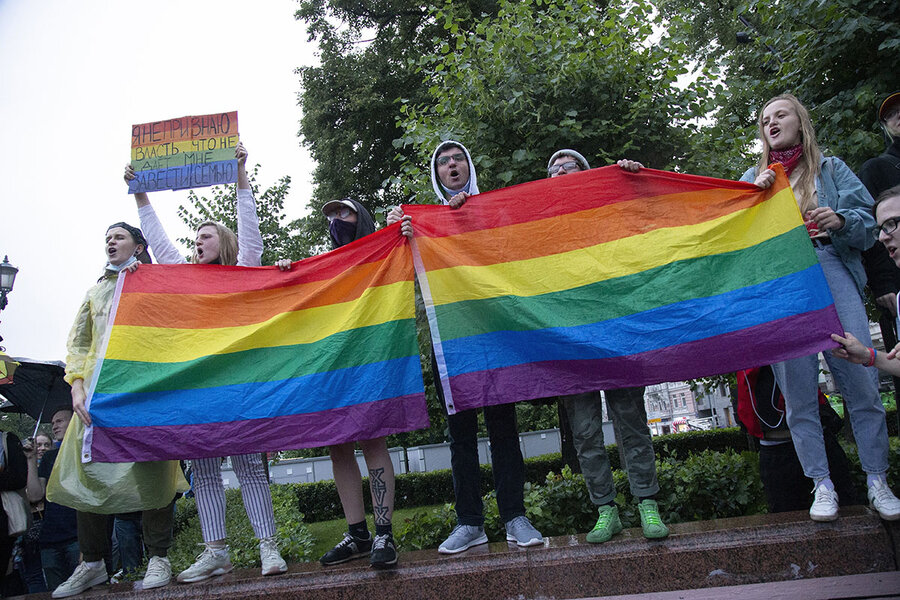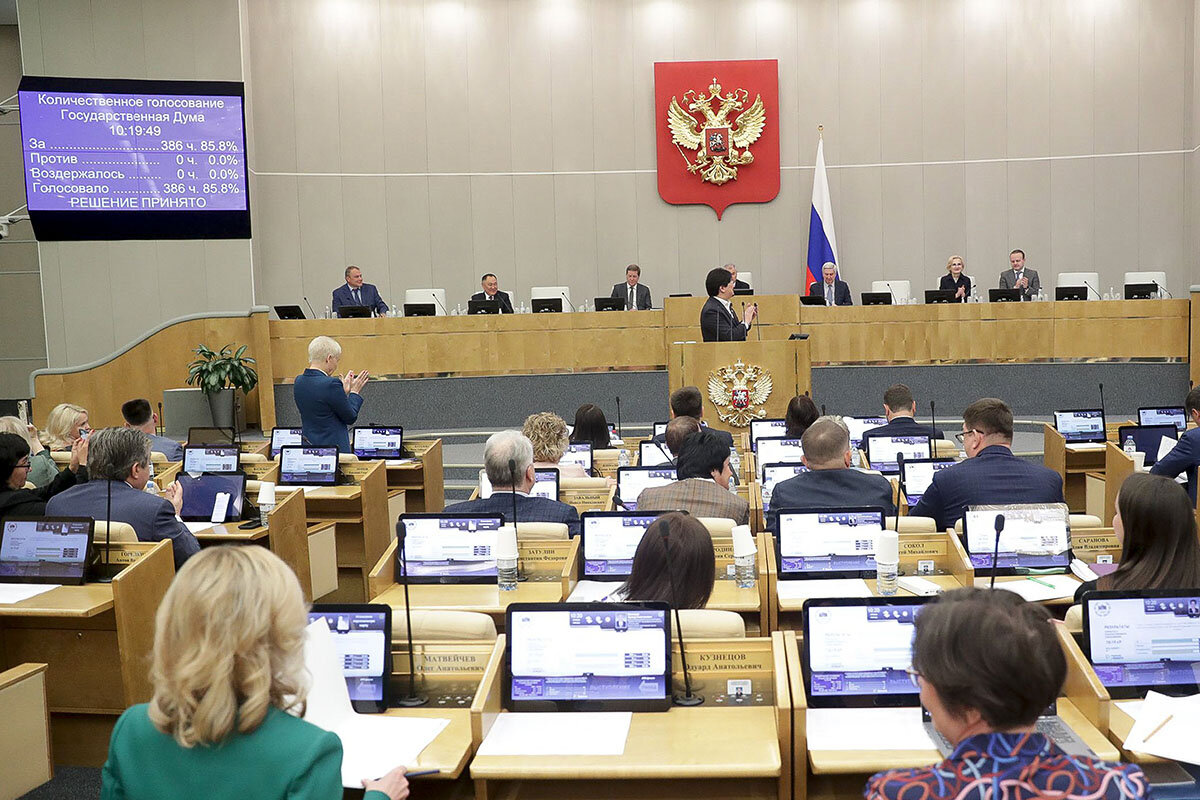Kremlin’s anti-trans law leaves many Russians asking, ‘Who’s next?’
Loading...
| Moscow
Russia’s transgender community is not large. Just under 3,000 people have officially changed their gender in an often lengthy and expensive procedure, overseen by a commission of medical and psychological experts.
But all those people’s lives have been cast into turmoil after Russian President Vladimir Putin signed a new law essentially banning transgender people in late July. They, and probably many more living in the shadows, will now be thrown into legal limbo, deprived of health care and official status.
The new law bans any kind of gender-affirmation surgery or hormone treatment and closes all previous avenues for a person to change their gender in official documents. It also annuls the marriage of any person who has transitioned and forbids them from adopting or acting as guardians to children.
Why We Wrote This
A story focused onThe Kremlin’s ban on gender-affirming care signals an acceleration of Russia’s authoritarian drift, with treatment of trans people as a signal to distinguish Russia from the West.
“We are left with nothing,” says Nef Cellarius, coordinator of Peer-to-Peer, a consultancy for transgender and nonbinary people. He says it’s impossible to count the actual number of transgender Russians because many live in “stealth mode,” hiding in their previous gender or their new one, and now find themselves virtual outcasts. “We cannot change our ID. We can’t obtain hormone or surgical treatments. This is a disaster.”
The new law is a draconian departure from previous Russian legal practice and, some experts warn, a sign of things to come as the 18-month-old war in Ukraine accelerates Russia’s drift into political authoritarianism and social intolerance. Though far more sweeping in its harsh treatment of one beleaguered community than anything in the past, the law seems to be an outgrowth of an ideological drive to create a unified “majoritarian” Russian society that’s been underway for about a decade. The war has greatly accelerated the official urge to differentiate Russia ideologically from the West while increasing the pressure to create a semblance of social unity behind the Kremlin.
“A new state ideology positioned as conservative is being formed,” says Irina Tartakovskaya, an expert with the official Institute of Sociology in Moscow. “The basic idea is that Russia differs from the rest of the world, with different ideas and purposes. We declare respect for tradition and claim that the West has turned away from it. ... But when you get down to it, how is Russia really different? Strong families? Many children? No. Our divorce and birth rates are European. Men and women here behave much as they do in Europe. Hence, we declare a different attitude toward LGBTQ people and the transgender community. They may develop normally in the West amid a tolerant attitude, but the situation in Russia is different.”
“You are not protected”
Mr. Putin’s return to the Kremlin for a third presidential term in 2012, following a massive wave of public protests, is identified by many as the starting point for the hardening of Russian political culture and curbs on social diversity.
A new law banning public expressions of “nontraditional” sexual orientation was enacted, casting a chill over the country’s LGBTQ+ community by effectively outlawing public expressions of gay identity. Laws that compelled civil society groups to register as “foreign agents” if they received outside funding were introduced and progressively toughened. Last December, the anti-gay propaganda law was amended to ban any expression of “nontraditional” sexual identity on any media platform.
“During Putin’s first term, in the early 2000s, there was little effort to interfere with peoples’ personal rights. You had the feeling that you could live your life pretty much as you wished,” says Masha Lipman, editor of Russia Post, a journal of contemporary Russian affairs published by George Washington University. “But the relatively liberal atmosphere of the early Putin years culminated in mass protests and led to a hardening in the next decade.”
Many analysts say that Russia’s gay and trans communities have been targeted because they are small and relatively powerless, and the Russian majority tends to be socially conservative and receptive to such legal restrictions. A survey by Russia’s only independent pollster, the Levada Center, found in 2021 that a quarter of Russians believed that same-sex relationships between consenting adults were OK, up from 19% in 2015. However, the number of people who said they “do not support” such relationships grew from 58% to 69% between 2015 and 2021, while the number who found it “difficult to answer” dwindled from 23% to 7%.
Egor Kotkin, a socialist writer who is openly gay but careful about his lifestyle, says most of the people in his immediate surroundings have a “normal attitude,” but the atmosphere outside his social circle has definitely chilled since laws began to explicitly single out gay identity.
“If you were attacked by homophobes 15 years ago, and the police were called, they would protect you. Nowadays, the police would protect them,” he says. “It’s not a surprise that migration of LGBT people from Russia has greatly increased, especially since the war. We are second-class citizens here, and even if the law doesn’t specifically outlaw homosexuality, you know that you are not protected.”
The situation for trans Russians in the wake of the new law is far more dire.
“In the past, people could get hormonal treatment, occasionally surgery, and, if successful, they could get certificates and go on to change their official documents,” says Alexander Kondakov, an expert at University College Dublin. “That’s all abolished. Those certificates are now null and void. Overnight, people are stripped of their rights, denied health care, and returned to the status of pariahs.”
The war has intensified the social and political pressures upon Russians not merely to conform but also to view people with “nontraditional” characteristics as enemies.
“All the nasty things about this regime have been boosted. There is an effort to convince people that the West is working against us, targeting Russian society through influences like LGBT people, and it must be excluded from our midst,” says Ms. Lipman of Russia Post. “The ideological realm has become much more important over the past 18 months.”
Mr. Cellarius, who is also the program coordinator for LGBTQ+ rights group Coming Out, says the law is a template for future legislation that will target other groups. “You start with someone who’s invisible, as trans people are in Russia, and if people accept that, the list grows,” he says. “Nobody is safe.”







